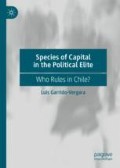Abstract
In the previous chapters, this study has sought to explain the nature of the party elites during the political transition; to describe and explain the main aspects of the party elites’ background and social resources, including their family networks (independent variables); and to measure the effect of those variables on individuals’ chances of achieving strategic positions in the political field, comparing the legislative and executive branches as represented by deputies and ministers (dependent variable). The quantitative data was obtained from 386 members of the nucleus of the Chilean political elite, who were surveyed to obtain information about their social, academic and family background, social resources and professional and political careers, among other topics.
Access this chapter
Tax calculation will be finalised at checkout
Purchases are for personal use only
References
Camp, R. (1996). Reclutamiento político en México, 1884–1991. Mexico: Siglo XXI.
Camp, R. (2013). Political recruitment across two centuries: Mexico, 1884–1991. University of Texas Press.
Dahl, R. (1961). Who Governs?: Democracy and Power in an American City. New Haven, CT: Yale University Press.
Garretón, M. (1999). Chile 1997-1998: The Revenge of Incomplete Democratization. International Affairs, 75(2), 259–267.
González-Bustamante, B. (2013). Factores de acceso y permanencia de la élite política gubernamental en Chile (1990-2010). Política. Revista de Ciencia Política, 51(1), 119–153.
Hoffmann-Lange, U. (2007). Methods of Elite Research. In R. Dalton & H.-D. Klingemann (Eds.), The Oxford Handbook of Political Behavior. Oxford: Oxford University Press.
Joignant, A. (2014). El capital político familiar: ventajas de parentela y concentraciones de mercado en las elecciones generales chilenas de 2013. Política. Revista de Ciencia Política, 52(2), 13–48.
Lake Frank, Z. (2001). Elite families and oligarchic politics on the Brazilian frontier: Mato Grosso, 1889–1937. Latin American Research Review, 49–74.
Luna, J., & Altman, D. (2011). Uprooted but Stable: Chilean Parties and the Concept of Party System Institutionalization. Latin American Politics and Society, 53(2), 1–28.
Navia, P. (2009). The Successful Chilean Left: Neo-Liberal and Socialist. In J. Castañeda & M. Morales (Eds.), Leftovers. Tales of the Latin American Left (pp. 141–162). New York: Routledge.
Rovira Kaltwasser, C. (2009). Populismus: Jenseits seiner Dämonisierung oder Vergötterung. Berliner Debatte Initial, 20(1), 69–77.
Rovira Kaltwasser, C. (2018). Political Elites in Latin America. In H. Best, & J. Higley (Eds), The Palgrave Handbook of Political Elites (pp. 255–271). Palgrave McMillan. doi:10.1057/978-1-137-51904-7_18
Siavelis, P. (2009). Enclaves de la transición y democracia chilena. Revista de Ciencia Política, 29(1), 3–21.
Thumala, A. (2007). Riqueza y piedad: el catolicismo de la élite económica chilena. Santiago: Debate.
Torcal, M., & Mainwaring, S. (2002). The Political Recrafting of Social Bases of Party Competition: Chile, 1973–95. British Journal of Political Science, 33(1), 55–84.
Author information
Authors and Affiliations
Corresponding author
Rights and permissions
Copyright information
© 2020 The Author(s)
About this chapter
Cite this chapter
Garrido-Vergara, L. (2020). Conclusions and Discussion. In: Species of Capital in the Political Elite. Palgrave Macmillan, Cham. https://doi.org/10.1007/978-3-030-41172-5_10
Download citation
DOI: https://doi.org/10.1007/978-3-030-41172-5_10
Published:
Publisher Name: Palgrave Macmillan, Cham
Print ISBN: 978-3-030-41171-8
Online ISBN: 978-3-030-41172-5
eBook Packages: Social SciencesSocial Sciences (R0)

